What Are the Health Benefits of Watermelon: A Review
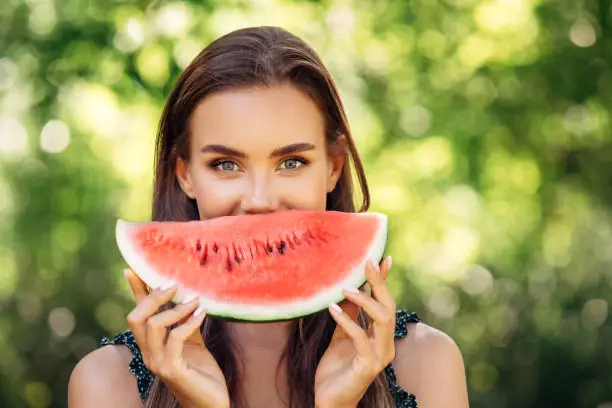
Juicy and velvety, watermelons are truly unrivaled. What are the health benefits of watermelon? Can you eat its seeds? Is it good for pregnant women? Can you eat it before bed? Read on and you will find the answers to all these and numerous other questions.
Health Benefits of Watermelons in Your Diet
While the pulp of this fruit tastes incredibly good, its health benefits come not from high vitamin, mineral, or caloric content but rather from an abundance of a bioactive compound called lycopene.
Low in Calories and Helps You Stay Hydrated
While this might sound extremely surprising, despite having a pronouncedly sweet taste, watermelon does not provide a high amount of energy. One hundred grams (3.5 oz) of this fruit contain 30 kilocalories (which is only two times as high as the caloric content of cucumbers). The reason for this is the high water content of watermelons: water makes up more than 91% of their weight.
While not an ideal choice for shedding pounds, watermelons are still not likely to help you gain weight. You can eat them freely, and they will not do much for your waistline. What’s more, they help you stay hydrated, which is extremely important for having regular bowel movements and reducing the risk of kidney stone formation.
Vitamin C is the only vitamin watermelon is relatively rich in: the content of all other vitamins and minerals is very low. The same is also true for proteins and fats: there are only 0.15 grams of fat and about 0.6 grams of protein per 100 grams of this fruit.
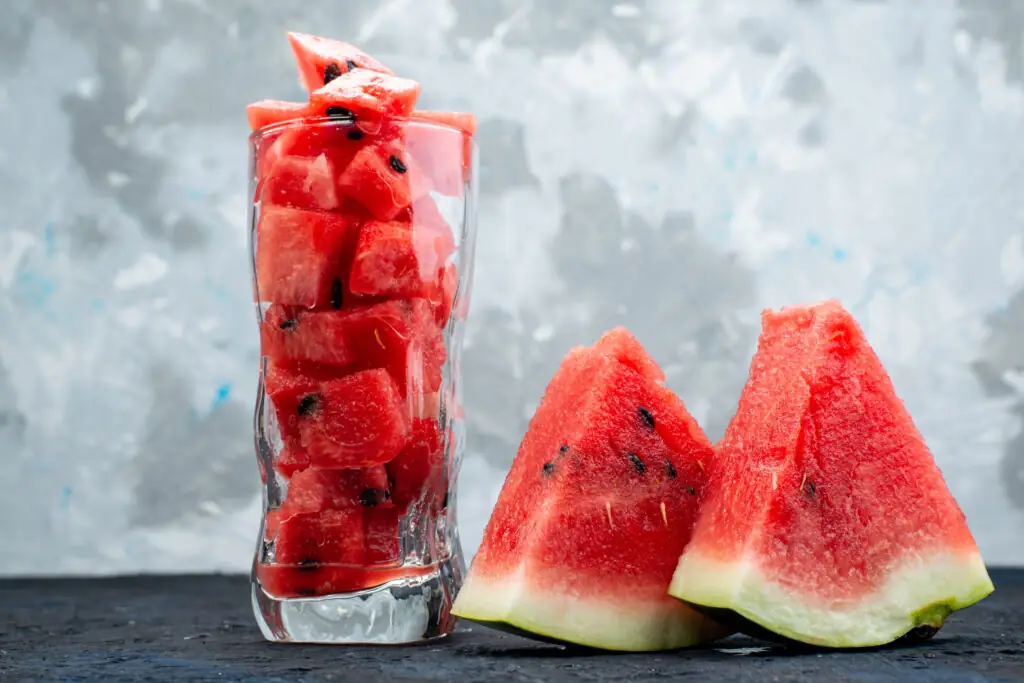
High Lycopene Content
Watermelon pulp gets its bright red color from high quantities of lycopene, a complex organic compound that belongs to the carotenoid family. While additional research is required, it is believed that lycopene-rich foods (like watermelons, carrots, tomatoes, and pink grapefruit) can improve symptoms of numerous health conditions.
May Protect Against Oxidative Stress
There are numerous studies (both in vitro and in vivo ones) that firmly confirm the antioxidant properties of lycopene. It is also important to note that this compound was demonstrated to be non-toxic: you can get very high doses of it from food sources and experience no adverse side effects.
May Have Anticancer Properties
There are several recent reviews that indicate that diets high in lycopene (like the Mediterranean diet) are associated with a lower risk of colorectal and prostate cancer.
May Help Your Heart Health
Lycopene was demonstrated to suppress the synthesis of cholesterol and remove ‘bad’ low-density cholesterol from circulation. What’s more, there is evidence that high lycopene intake can lower the thickness of the internal layers of your blood vessels. All these effects can improve circulation and prevent your heart from overloading.
May Reduce the Risks of Macular Degeneration
Macular degeneration is an eye problem that is common among older people. A 2015 study found that lycopene is beneficial for retinal pigment epithelium cells and can potentially delay the onset of age-related macular degeneration.
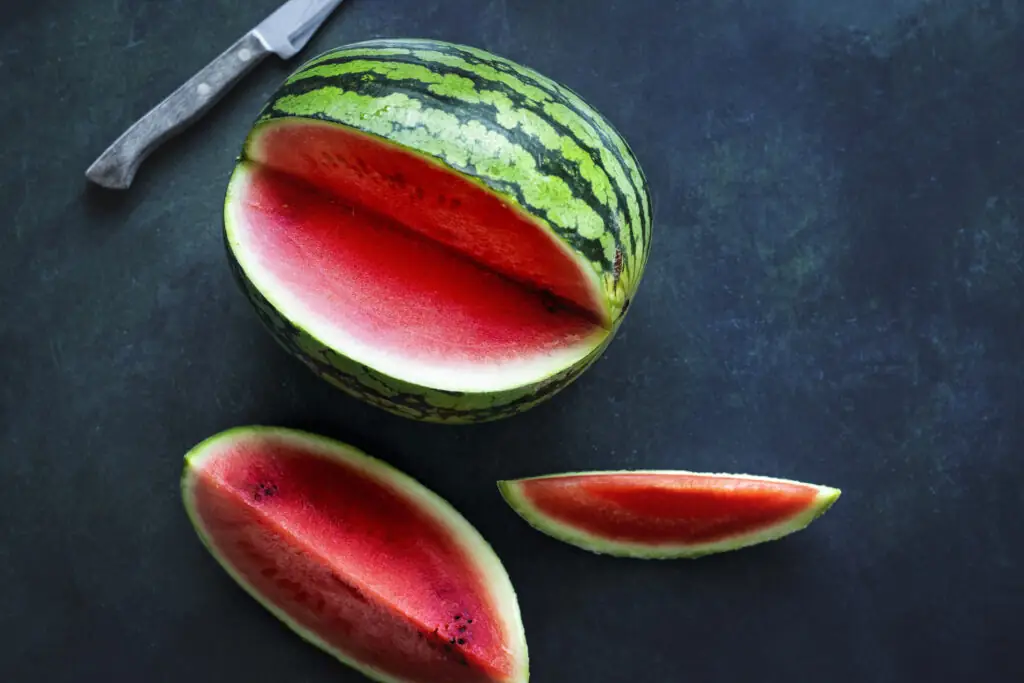
Is Watermelon Bad for You at Night?
The main drawback of eating this fruit before bed is its extremely high water content. People who eat substantial quantities of watermelon before going to bed very often wake up in the middle of the night with a strong urge to go to the bathroom. Interruptions in your sleep prevent you from having enough rest, so you are very likely to feel drowsy in the morning. Thus, it is recommended that you avoid eating large quantities of this fruit in the evening.
What Are the Health Benefits of Watermelon Rind (or Bark)?
Some sources claim that watermelons are rich in an amino acid called citrulline, which can help reduce blood pressure. While technically it is true — there are indeed high amounts of citrulline in watermelon — almost all of them are concentrated in the rind of this fruit. Thus, if you only eat watermelon pulp, you get almost no citrulline.
Contrary to a popular misconception that watermelon rind cannot be eaten, it is, in fact, completely edible, and there are numerous delicious recipes that make use of it. One of the easiest ways to introduce rinds to your diet is to peel and pulverize them using your blender or food processor and then use them for your smoothies.
Rinds can also be pickled and fermented, and there are people who absolutely adore such dishes. What’s more, fermented food is a great way to improve your gut health as it contains beneficial bacteria.
If you still find the idea of eating watermelon rinds unappetizing, you can use a dietary supplement instead:
L-Citrulline by California Gold Nutrition
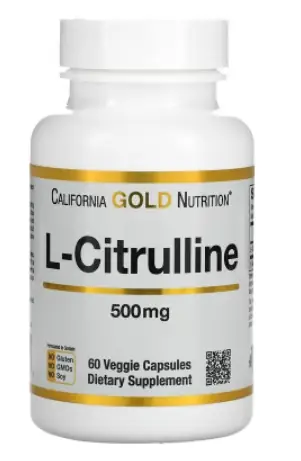
- 500 mg per capsule, 60 capsules
- Relieves muscle soreness after a strenuous workout
- Safe even in high doses
- Well-known brand
What Are the Health Benefits of a Watermelon and Banana Smoothie?
If you combine bananas and watermelons (including rinds) in a velvety smoothie, you get:
- Lycopene that can reduce oxidative stress and protect your heart
- Citrulline to normalize your blood pressure
- Large quantities of vitamin C (important for the immune system), and vitamins B2, B5, B6, B9 (essential for cellular energy production)
- Manganese (required for bone formation and numerous other biological processes)
- Dietary fiber that helps propagation of beneficial bacteria in the gut
The main drawback of such a drink is that it contains a lot of sugars. It is better to drink it in the morning to have enough time to burn off extra calories.
What Are the Health Benefits of Watermelon and Pineapple Juice?
While pineapple juice contains measurable amounts of vitamins C and B6, it is also loaded with sugars (14 grams per 100 grams of juice). The best use for such a mixture is to get a quick energy boost right before or after strenuous exercise or hard work. Consuming it without making every effort to burn off calories can be bad for your waistline. What’s more, sudden spikes in blood sugar can lead to the development of type 2 diabetes in susceptible individuals.
What Are the Health Benefits of Watermelon and Ginger?
A pinch of ginger powder added to your watermelon beverages and smoothies can do more than simply improve their taste.
Just like lycopene, gingerol, the most important bioactive compound found in ginger, has pronounced antioxidant properties. What’s more, due to its anti-inflammatory and antimicrobial effects, ginger can be used to prevent common flu and respiratory infections. Last but not least, ginger can alleviate the symptoms of indigestion and is ideal for relieving the symptoms of motion sickness.
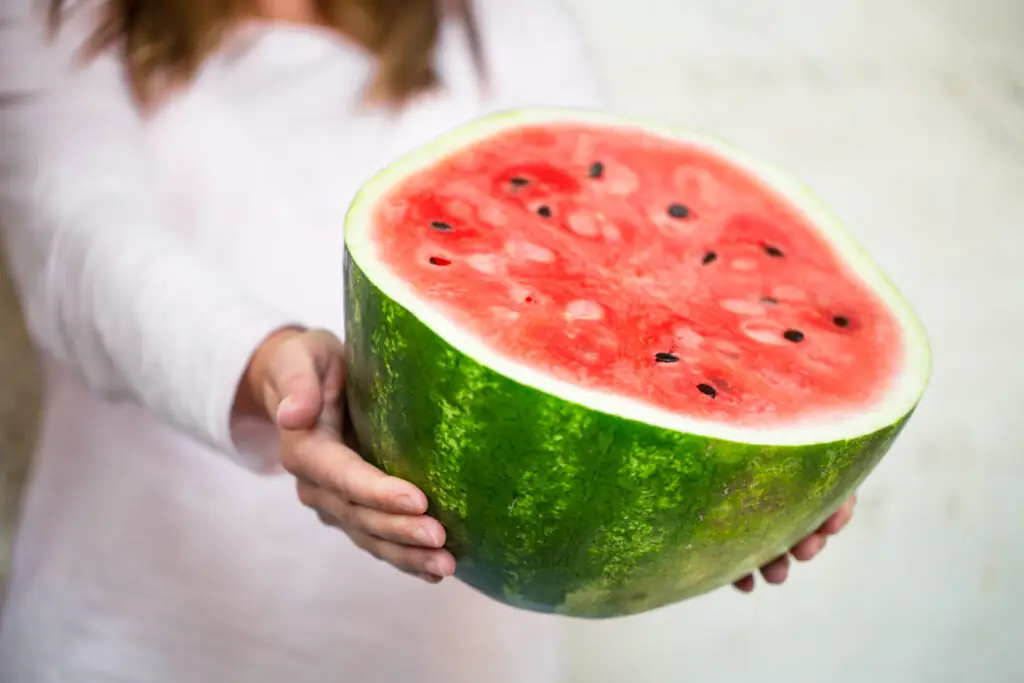
What Are the Health Benefits of Watermelon and Its Seeds in Pregnancy?
In a 2003 study it was found that 4 mg of lycopene per day (the quantity that can be found in about 100 grams or ⅔ cup of watermelon) is enough to lower the risk of pre-eclampsia by about 50%. Pre-eclampsia is a condition that usually starts after 20 weeks of pregnancy and is characterized by high blood pressure and loss of protein via urine.
As watermelons promote hydration, their consumption can bring down risks of constipation and hemorrhoids to a minimum. There is also anecdotal evidence that watermelon juice can be used to treat morning sickness (although ginger ale seems to work better for this condition).
Still, women who suffer from diabetes or whose blood sugar levels have increased during pregnancy need to consume watermelons with caution, as they can cause potentially unsafe spikes in blood sugar.
To prevent the risk of food poisoning, it is recommended that pregnant women avoid eating watermelons that were not refrigerated for longer than 2 hours.
Some pregnant women also roast watermelon seeds in a microwave oven (7.5 minutes on one side and 7.5 minutes on another at the temperature of 325°F or 160°C) and use them as a crispy snack that, allegedly, can prevent skin pigmentation and reduce muscle cramps. Although medical science neither supports nor refutes these claims, you can give these seeds a try and see for yourself whether they work or not.
What Are the Health Benefits of Watermelon for Toddlers?
This fruit is not a common allergen and can be introduced when your baby is 6 months old. The high water content of watermelons makes them excellent for the prevention of constipation; this is why this fruit (just like blueberries) is recommended for babies who are experiencing harder stools. Still, avoid feeding your baby or toddler excessive quantities of watermelon, as this can lead to lesser stool or even diarrhea. Be sure to remove the seed for the pulp when giving it to your baby, as they pose a choking hazard for small children.Now you know what are the health benefits of watermelon. This fruit is excellent for hydrating and getting copious amounts of lycopene; it is also believed that it can improve the symptoms of morning sickness in pregnant women. Velvety sweet, it doesn’t contain a lot of calories: a truly winning combination!